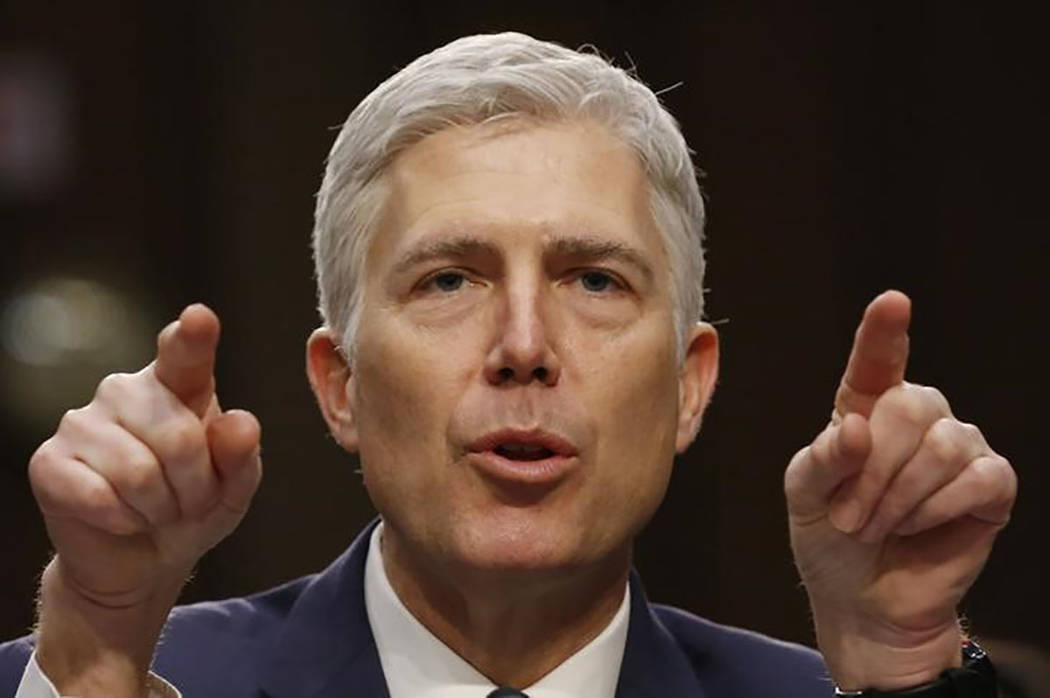Neil Gorsuch nomination expected to set up showdown
WASHINGTON — Judiciary Committee Republicans are expected to vote Monday to advance the Supreme Court nomination of Judge Neil Gorsuch to the full Senate, setting up a showdown this week with Democrats threatening to block his confirmation.
Republicans hold an 11-9 majority on the committee. The vote by the panel follows four days of testimony by Gorsuch, 49, who currently sits on the Denver-based 10th Circuit Court of Appeals.
Democrats are threatening to filibuster President Donald Trump’s nominee, citing Gorsuch rulings and his failure to answer questions during the hearing. They’re also grumbling that Republicans last year refused a hearing for Judge Merrick Garland, nominated for the post by President Barack Obama.
Sen. Charles Grassley, R-Iowa, the Judiciary Committee chairman, said he was “stunned” when he heard that Democrats would seek to block the Gorsuch nomination.
“If he isn’t qualified, then nobody is,” Grassley said.
Republicans this week are expected to vote en bloc for the nomination.
Sen. Dean Heller, R-Nev., said he will support the nomination, citing Gorsuch’s Colorado background and understanding of issues like water and energy.
“A Western perspective will serve the people of Nevada and the Supreme Court well, and I’ll work with my colleagues to ensure that Judge Gorsuch is confirmed to serve on our nation’s highest court,” Heller said.
Senate Democratic Leader Chuck Schumer, D-N.Y., is whipping his caucus to vote against a parliamentary rule to shut off debate and allow a simple up-or-down vote.
Republicans need 60 votes to end a filibuster and vote on the nomination.
Sen. Catherine Cortez Masto, D-Nev., said she will vote to filibuster and not to confirm Gorsuch.
“While Judge Gorsuch’s qualifications are impressive, I remain concerned that his narrow view of the law will hurt the most vulnerable amongst us,” Cortez Masto said.
Gorsuch met with 29 senators, according to the White House. Cortez Masto said he did not meet with her, despite her requests that he do so. She said that oversight disrespected the Senate’s role of advice and consent on nominations.
Sen. Chris Coons, D-Del., said Republicans are unlikely to peel off eight Democrats to break a filibuster. That could force Republican leaders to trigger the “nuclear option,” a rule change that eliminates the 60-vote majority rule.
The nuclear option was last triggered by former Senate Majority Leader Harry Reid, D-Nev., in 2013 when Republicans blocked President Barack Obama’s judicial nominees. Democrats, then in the majority, changed the rule for lower judicial nominees but left it intact for Supreme Court appointments.
Reid told the Review-Journal last year that he did not regret changing the rule, which allowed 98 lower court justices to be appointed to federal benches. But he said he understood then that it could come back to haunt Democrats if they lost the majority.
Now, Republicans, who hold a slim 52-48 majority, face the same dilemma.
President Donald Trump has encouraged Senate Majority Leader Mitch McConnell, R-Ky., to use the nuclear option, and McConnell has vowed to get Gorsuch on the bench.
Gorsuch would replace conservative Justice Antonin Scalia, who died Feb. 13, 2016, in Texas. Gorsuch would retain the 5-4 conservative split on the high court.
Some legal experts have argued that Democrats should hold back on a filibuster of Gorsuch and instead use the parliamentary tactic to block a nominee if another seat on the court becomes vacant and a nominee is selected who would push the court farther to the right.
Carl Tobias, an expert on the judiciary at the University of Richmond School of Law, said Democrats are probably right to use the filibuster now, because the GOP will ignite the nuclear option the next time around.
There is little left to be lost.
“The lower courts were already nuked,” Tobias said.
Contact Gary Martin at gmartin@reviewjournal.com or 202-662-7390. Follow @garymartindc on Twitter.
BREAKING DOWN THE VOTE
— Senate Republicans, who control the Senate 52-48, are hoping to vote April 7 to confirm Judge Neil Gorsuch's nomination to the U.S. Supreme Court.
— Democrats are attempting use a procedural hurdle called a filibuster that requires 60 votes to allow a confirmation vote; they need 41 votes to sustain the filibuster.
— As of Friday afternoon, 36 Democrats had indicated their support for such a move. Two Democrats have said they support Gorsuch. Another two have voiced opposition to Gorsuch but have not made clear whether they would support a filibuster.
— Seven Democrats and one independent, Angus King of Maine, who usually votes with them, have not yet announced their position.
SOURCE: Reuters

















